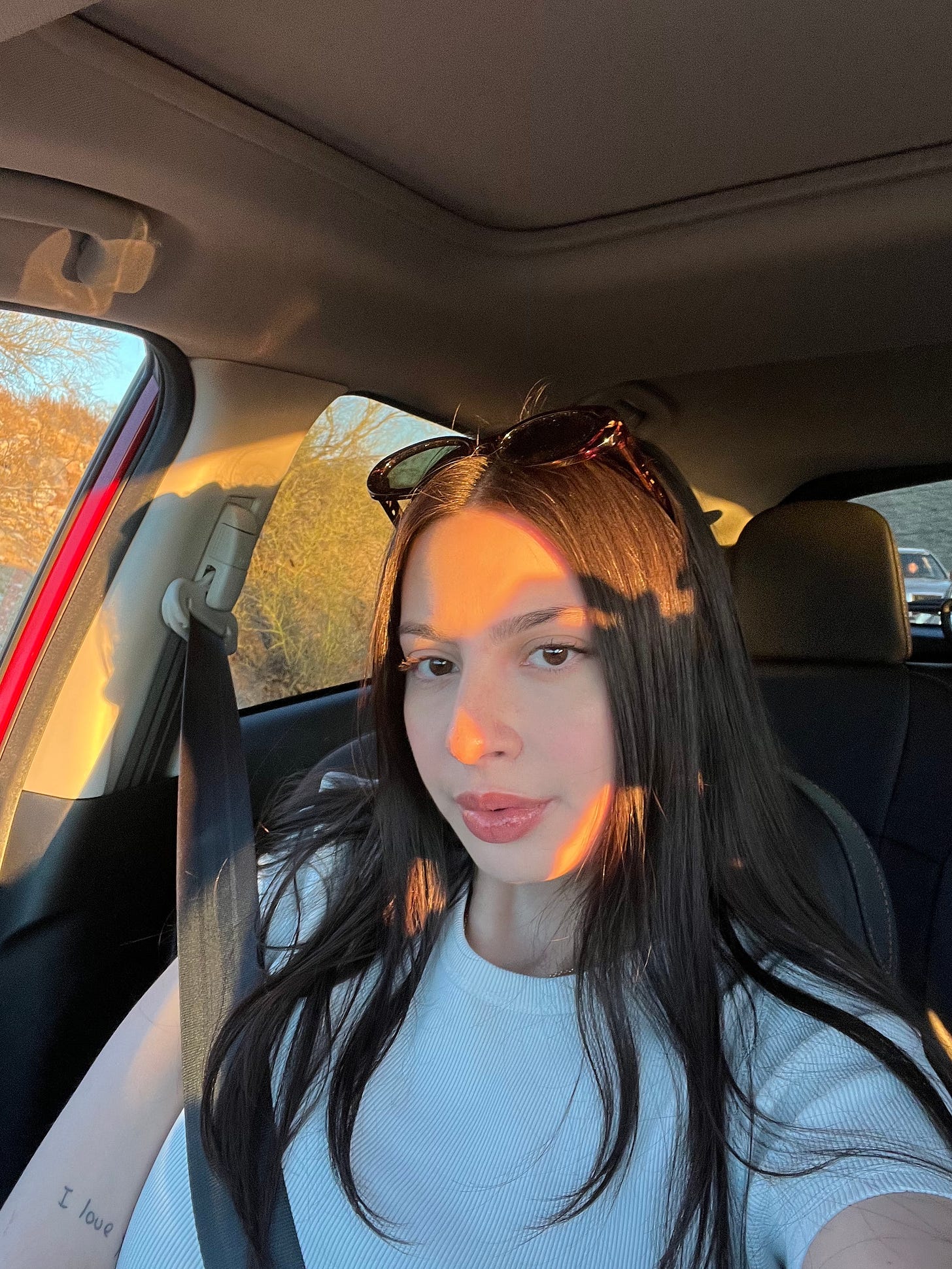What I learned from my transition to adult cardiac care
Guest writer Maria Lata's move from the pediatric cardiology team she'd known for a decade was "a pivotal part" of her life.
Welcome! This is The Heart Dialogues, a free newsletter for people born with heart conditions (and the people who care about them). Join this community by adding your email below. Every other week, you’ll get an edition in your inbox with candid conversations, essays, links, recommendations, reader threads and other good stuff about what it’s really like to live with a weird and special heart.
I first encountered
’s work through this beautiful and complex piece about being a heart transplant recipient. She writes , a Substack of monthly essays on creativity, identity, New York City, chronic illness and much more. So I was elated when she reached out to contribute a guest essay to about her move from pediatric to adult cardiac care.This transition is often fraught for congenital heart disease patients. Doctors and nurses who may have treated us for our whole lives—indeed, even saved our lives—are replaced by strangers who won’t sugarcoat the situation. Parents play a smaller role, forcing us to learn and advocate for ourselves. The hassle and expense become our responsibility alone, or at least it can feel that way. Not surprisingly, this is the moment when many stop seeing a cardiologist altogether.
Maria’s essay shows one unflinching view of the emotional and practical hurdles of this transition. Everyone’s story will be different, but many of the themes will be familiar: This is hard. And also, we can do this.
I thought transitioning my cardiac care when I was 22 would be a breeze. I had been fully managing my health since I was 18. I was used to scheduling my own appointments, staying on top of my prescriptions and refills, and obtaining transportation. I was only moving to a different group of doctors within the same New York hospital—from the pediatric cardiology team I’d known for a decade to a new team of advanced heart failure and cardiac transplant doctors.
But I hadn't realized how comfortable I was with my pediatric team or the amount of responsibility that comes with adult care. Six months later, when I abruptly decided to move across the country from Queens, N.Y., to Phoenix, I switched my care to a new hospital. All of that change in such a short amount of time felt jarring. It was necessary for my well-being but, wow, was I naive. I did not realize the impact it would have on me.
Finding a new environment
I was born with hypoplastic left heart syndrome, a rare type of congenital heart condition where the left side of my heart was underdeveloped, affecting blood flow. I had three open heart surgeries—at 3 months old, 9 months old and 2 years old. I received a heart transplant in 2010, when I was 11.
My pediatric care was life-saving, but even with the three surgeries, I was still very ill. My lips and fingertips would turn blue when I was cold as my blood oxygen levels were much lower than what was considered healthy. I would get winded going up a single flight of stairs, so I couldn’t engage in many sports or gym class. I was treated with heart failure medications, and had routine check-ups that included frequent echocardiograms. The hospital was my second home. I had the same transplant team for over a decade. Everyone knew me so well, and I was used to how they ran things. In pediatrics, I was mostly around the same age as the other patients.
Now, I’m the youngest person at all of my appointments. I’m not sure if it makes me feel inadequate or what, but I get a funny feeling sometimes—like I won’t be taken seriously. I hadn’t realized that different doctors and different transplant centers can approach care in more than one way. That there’s not one universal way of treating heart disease and transplant patients. For instance, my previous team wanted to keep me on prednisone, a medicine I started after a rejection I had in 2011. My new team advised me to come off of it. It can be hard to know what to listen to sometimes. I expressed my concerns and reaffirmed them when needed. My doctor weaned me off the medication slowly and did a biopsy on me afterward to confirm there was no rejection after being off the prednisone.

Navigating the U.S. health insurance system
A couple of months after I settled into my move, I started to pay close attention to how convoluted our healthcare system is. I fell into a bit of depression. I had never been on my parents’ health insurance plan, even though I was under the age cutoff. They were both on disability. Because I was working part-time through college, I qualified for state Medicaid. Everything was covered. I never received a single bill.
Now, I’m seeing a $30,000 price tag next to the biopsy I had last year—a procedure that took 20 minutes in the cath lab. I’m in what feels like a brawl with my insurance company because they denied the claim for a colonoscopy I had last summer—a $10,000 procedure that I never would have consented to if I’d known the ordeal it would put me through. I see how expensive my medications are each month, and it takes a toll on me.
I currently work a job with good medical benefits, but I’m not happy, and it’s not where my heart is. I see how easy it is for people to become complacent in their jobs because of the headache it is to do something else, to change insurance, to find new doctors, etc. It breaks my heart. I’m much more afraid of getting sick knowing that there’s a financial responsibility that comes with it.
A period of grief and anger
Two of the hardest things for me have been finding my voice in my care and grieving the ease that comes with pediatric care.
I was a chronically ill kid and, while I didn’t have a typical childhood, my health was always the priority for my family. There was not a single worry I had to carry. Everything else came second. School worked around me. I had more help than I ever knew what to do with.
I was not prepared for the level of intentional planning and energy it takes being a forever patient in adult care—between coordinating care, navigating health insurance, and finding a balance between work and rest. I’m always busy. I acknowledge the duality in both—I’m sad for those who understand my plight, and it helps to feel less alone knowing I’m not the only one fighting these battles.
Changing perspectives
Two years have passed since I moved and switched over my care. The only salve to this wound was changing my perspective. I’m not saying it’s easy work—it took over a year to do—but instead of asking, Why is our healthcare system this way? Why is this happening to me? I ask, What can I learn? How can I work with it? With the help of EMDR, a mental health treatment for trauma, I am learning to separate myself from the things that have happened to me. I have immense gratitude for my therapist for her help with these shifts.
If I could go back and change any of it, I wouldn’t. I’m such an anxious soul that sometimes I need to be thrown right in. Changing my care has been a pivotal part of my life. It taught me that if I did it once, I could do it again.
What has your experience been like moving from pediatric to adult care? What advice would you give to your younger self about the transition?







It’s interesting hearing about other patient experiences, especially on a topic I haven’t really had to deal with yet. I had my one and so far only OHS for VSD & double-chambered right ventricle at 16 months, and my pediatric program hospital (CT Children’s) ended up forming an adult congenital program too, so I got to stay not only with the hospital but my doctor as well - twenty plus years of care builds a lot of trust! I know at some point I’ll have to change programs be it due to a move or otherwise, but hopefully not for a few more years yet.
Thank you Maria for sharing this story. You’ve been thru helAnd back.
But that’s the key: your back!
To answer Leighs question : I feel my adult care is stupendous !! I had Two open hearts at 6,7. The first didn’t , The second one worked.
Because cardiac care is now so advanced in every aspect - tools techniques procedures plans staffing pharmacy and so on- I don’t worry at all about whether I will need a third. If I do, then I do.
But fingers crossed !
Woody Edelman